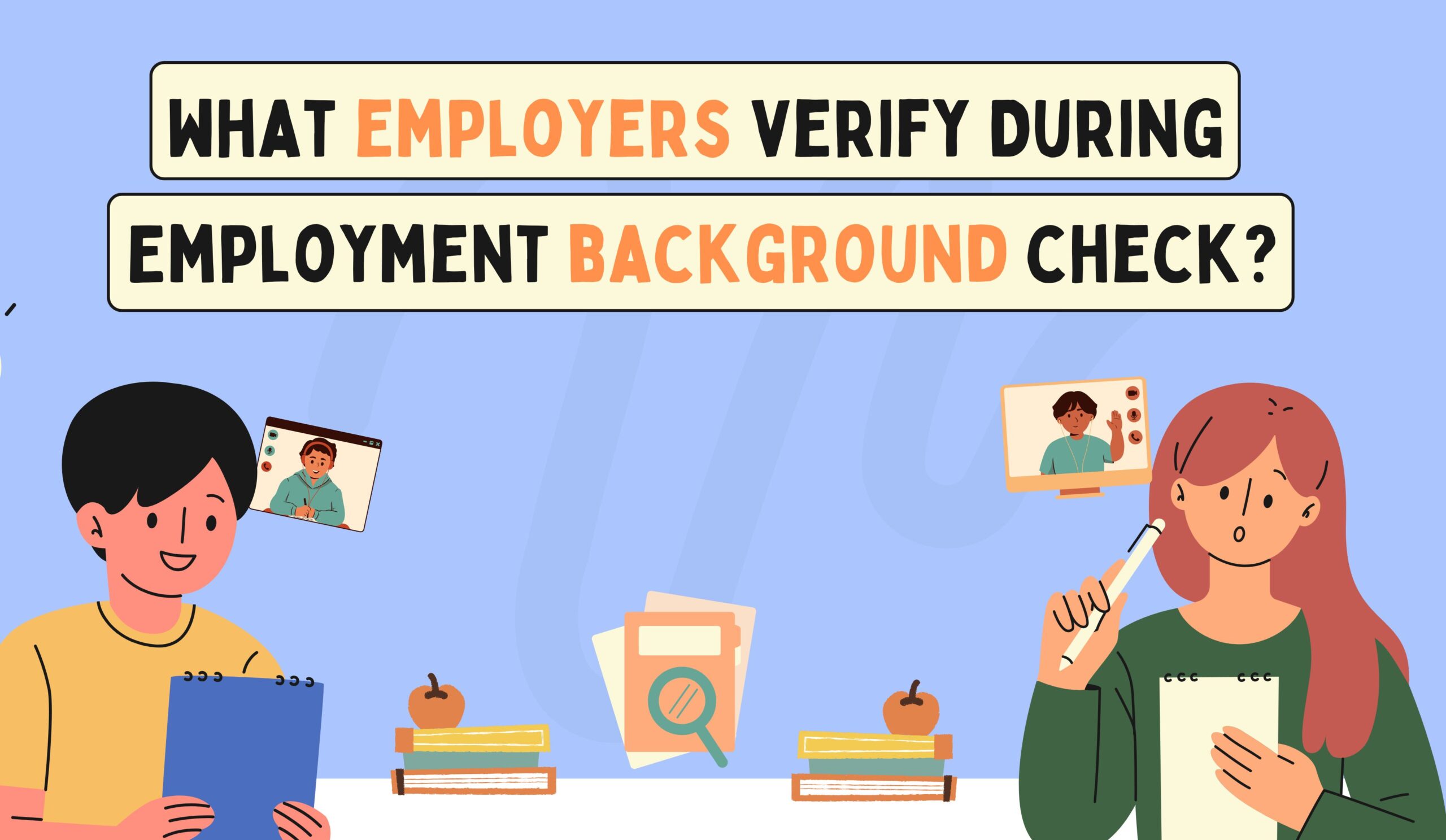Introduction
In today’s competitive job market, employers in the USA increasingly prioritize background verification of employment as a critical step in the hiring process. With candidates vying for limited positions, verifying their credentials and history ensures companies make informed hiring decisions.
Poor hiring decisions can lead to severe repercussions for organizations, including damaged reputations, legal penalties, and financial losses. A single oversight in the “verification of employment” background check, can result in compliance failures or even workplace safety risks, emphasizing the need for thorough employment background checks.
What is the Employment Background Check?
An employment background check involves reviewing a candidate’s personal, professional, and financial history to ensure their suitability for a role. These checks are vital to maintaining organizational integrity, compliance, and safety.
Key Goals
- Safeguarding Workplace Safety: Ensures that employees pose no threat to the work environment.
- Verifying Qualifications: Confirms candidates’ education, skills, and experience.
- Ensuring Compliance: Meets industry and legal requirements for specific roles.
Certain industries like healthcare, finance, and transportation have stringent background check standards. For instance, financial institutions often conduct credit history checks, while the healthcare sector emphasizes license verification.
Who Conducts Employment Background Checks?
Various entities can conduct employment background checks, each offering unique expertise and methods:
- Internal HR teams
- Third-party agencies
- Automated software solutions
- Freelance background check professionals
- Government or regulatory bodies
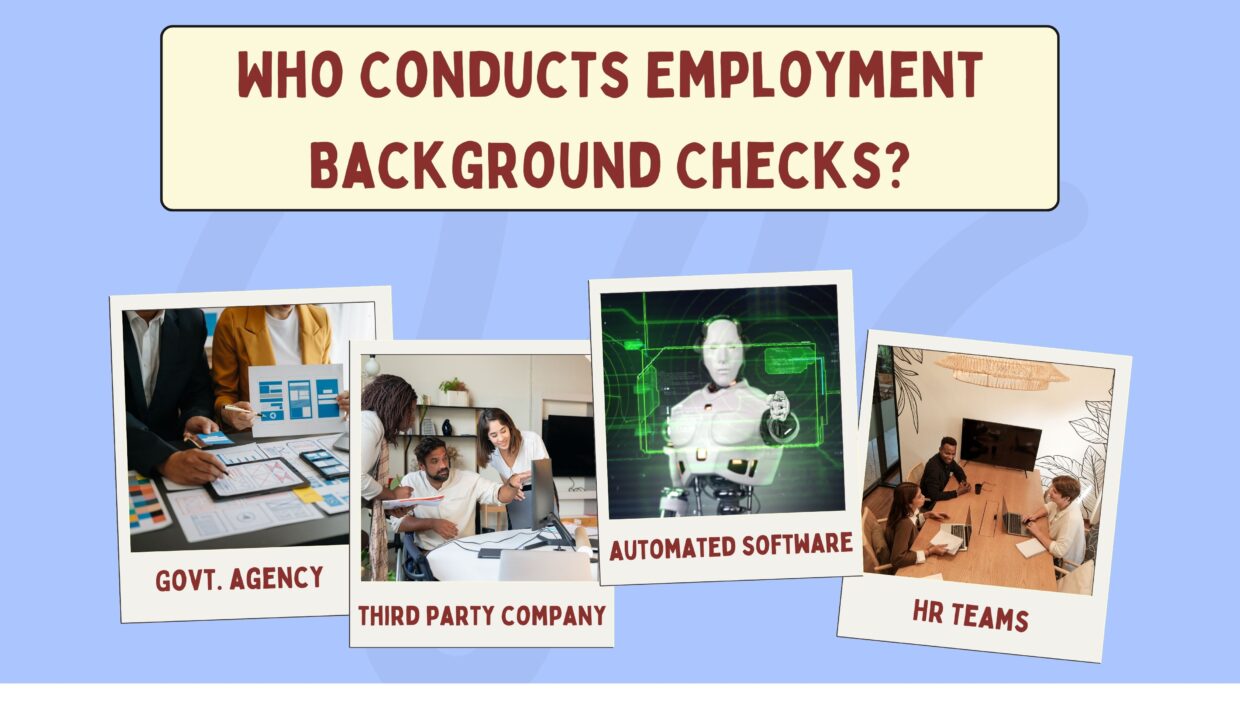
Benefits of Comprehensive Employment Background Checks
Comprehensive employment background checks offer several benefits to businesses. Here’s a closer look at these advantages:
Enhanced Workplace Safety
Hiring the wrong candidate can expose a company to various risks, including safety violations, workplace violence, or theft. Comprehensive employment background checks help identify any past criminal behavior, substance abuse issues, or safety violations, minimizing the risk of unsafe hires. Businesses can foster a safer and more secure workplace environment by ensuring the candidate’s history aligns with company standards.
Stronger Organizational Reputation
Hiring practices reflect an organization’s values and commitment to quality. By conducting thorough employment background checks, companies signal to their employees, clients, and stakeholders that they prioritize hiring trustworthy and qualified individuals. This strengthens the organization’s reputation and promotes a culture of integrity. Additionally, transparent and responsible hiring practices help mitigate the risks of reputational damage in case of a poor hire.
Reduced Turnover Costs
Hiring the wrong person can result in high turnover costs, which include recruitment expenses, training, and lost productivity. By using comprehensive employment background checks, employers can ensure that candidates are well-aligned with the job requirements and company culture. This leads to better employee retention, reducing the time and money spent on rehiring and retraining. By investing in thorough employment background checks, businesses can make informed hiring decisions that benefit long-term organizational stability.
Legal Framework and Compliance for Background Checks in the USA
1. Fair Credit Reporting Act (FCRA)
The FCRA governs how employers conduct employment background checks, ensuring candidate privacy and fairness. Employers must inform candidates of the checks and obtain written consent before proceeding.
2. EEOC Guidelines
The Equal Employment Opportunity Commission (EEOC) mandates that employment background checks do not discriminate against candidates based on race, gender, or other protected characteristics.
3. State-Specific Variations
Laws regarding employment background checks vary widely across states. For example, California has strict privacy laws, Texas emphasizes criminal checks, and New York enforces rigorous compliance standards.
Core Components Verified During Employment Background Checks
1. Employment History
Employment history verification ensures a candidate’s resume accurately reflects their work experience. Discrepancies, such as inflated job titles or exaggerated responsibilities, can signal a lack of honesty, which raises questions about the candidate’s integrity.
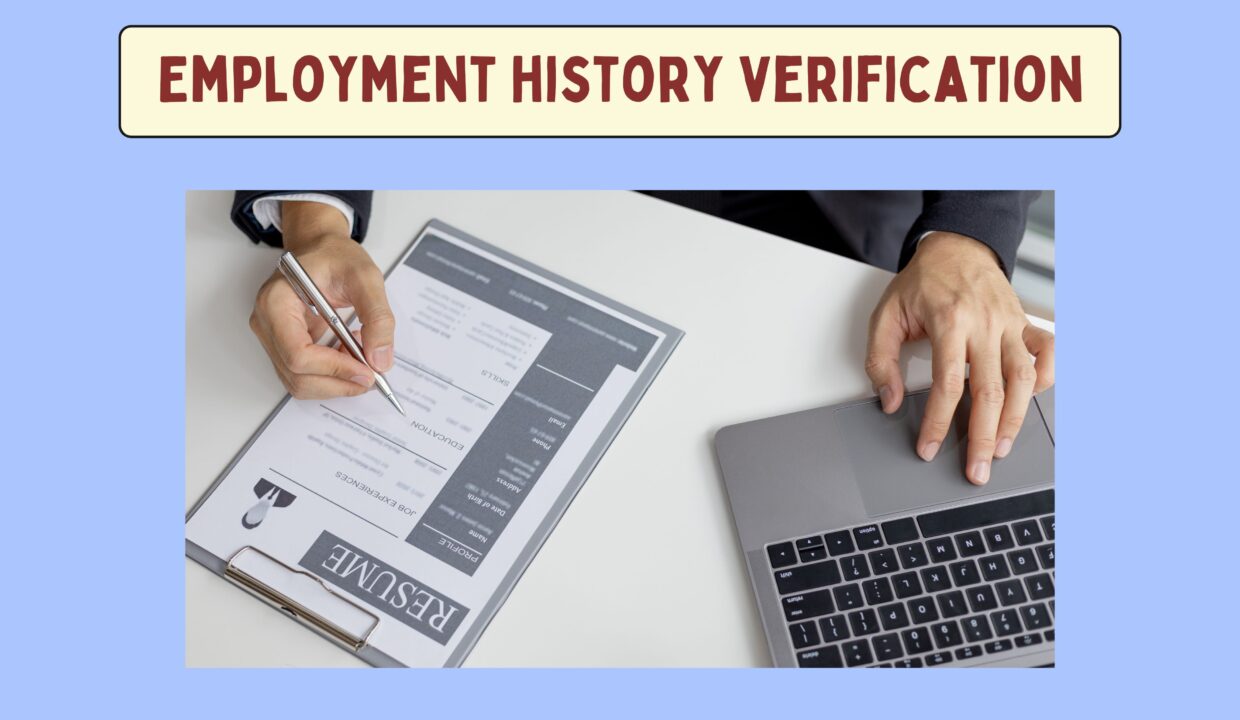
Employers contact previous employers to confirm the following:
- Job Titles: Verifying the exact roles held by the candidate during their tenure.
- Responsibilities: Ensuring the listed responsibilities align with the candidate’s claims.
- Dates of Employment: Confirm the duration of employment to avoid potential gaps or overlaps.
2. Education Verification
Education verification confirms the authenticity of degrees, certifications, and institutions mentioned in the candidate’s profile. It involves:
- Degree Validation: Checking whether the candidate completed the claimed degree program.
- Institution Accreditation: Ensuring the institution is recognized and accredited.
- Specializations and Certifications: Verifying any additional courses or certifications critical to the job, such as IT certifications or medical degrees.
3. Criminal Record Checks
A thorough criminal employment background check helps ensure workplace safety, especially for roles involving vulnerable populations, sensitive information, or financial responsibilities.

Employers conduct criminal record checks at federal, state, and county levels to identify:
- Felonies and Misdemeanors: Ensuring the candidate does not have a history of serious offenses.
- Pending Charges: Evaluating open cases that may affect their job suitability.
- Legal Compliance: Employers must adhere to ban-the-box laws, which regulate when and how criminal records can be considered in hiring decisions.
4. Identity Verification
Identity verification protects against identity fraud and ensures the candidate is who they claim to be. Identity fraud poses a significant risk, potentially leading to unqualified individuals securing roles, financial fraud, or access to sensitive data.
Methods include:
- Social Security Number (SSN) Validation: Confirming the SSN matches the candidate’s name and other details.
- Government ID Verification: Checking driver’s licenses, passports, or other official documents.
5. Professional Licenses and Certifications
Hiring someone with expired or falsified credentials can have severe operational, reputational, and legal consequences, especially in regulated industries. Many industries require specific licenses or certifications, such as Medical Licenses for Doctors and Nurses, CPA Licenses for Accountants, and Professional Engineering (PE) Certifications for Engineers.
Employers verify:
- Validity of the License: Ensuring it is current and not expired.
- Accrediting Body: Checking the legitimacy of the issuing organization.
6. Credit History
Credit checks are commonly performed for roles with financial responsibilities, such as accounting, banking, or executive positions. A candidate’s financial stability can be an indicator of their reliability, especially in roles involving monetary decisions or access to sensitive financial data.

Employers review:
- Debt Levels: Ensuring the candidate does not pose a financial risk to the organization.
- Payment History: Assessing financial responsibility and trustworthiness.
Legal Compliance:
Under the Fair Credit Reporting Act (FCRA), employers must obtain written consent before conducting credit checks and ensure the findings are relevant to the job role.
7. Reference Checks
Reference checks provide a more personal perspective on a candidate’s suitability for the role beyond what’s listed on their resume or application. Employers contact professional references or former supervisors to gather additional insights into the candidate’s:
- Skills and Abilities: Validating whether the candidate possesses the required skills.
- Work Ethic: Assessing their attitude, teamwork, and reliability.
- Character: Understanding how the candidate may fit within the company culture.
8. Drug Testing
Substance abuse can compromise workplace safety, reduce productivity, and lead to costly accidents or liabilities. Drug tests are mandatory in industries like transportation, healthcare, and construction, where safety is paramount. These tests typically screen for:
- Common Substances: Drugs like marijuana, cocaine, amphetamines, and opioids.
- Alcohol Levels: Testing for substance abuse that could impair job performance.
The Verification Process: Step-by-Step Overview
1. Data Collection
The process begins by gathering essential details from the candidate, including employment history, educational credentials, and references. Written consent is required from the candidate, in compliance with regulations like the Fair Credit Reporting Act (FCRA). Accurate data collection ensures a reliable employment background check. Missing or incorrect information can delay the process.
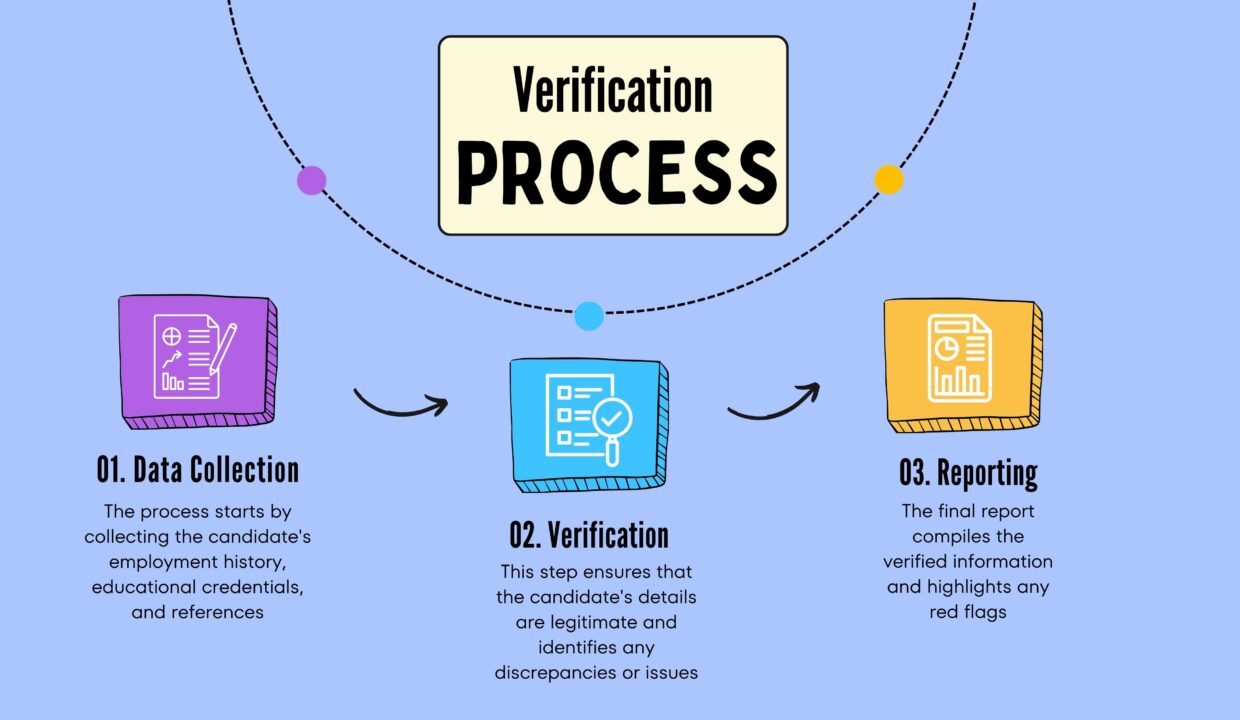
2. Verification
This step ensures the candidate’s details are legitimate and identifies any discrepancies or issues. Once the data is collected, it’s validated through various methods:
- Public Records and Databases: Reviewing criminal records, credit reports, and professional licenses.
- Cross-checking with Employers and Institutions: Confirming employment history, job titles, and educational qualifications.
- Third-Party Agencies or Software: Using external services to streamline and ensure accuracy.
3. Reporting
The final report compiles the verified information and highlights any red flags. The report enables employers to make informed decisions while maintaining compliance with legal standards.
- Verified Details: Includes confirmed employment history, education, and references.
- Potential Concerns: Identifies discrepancies, criminal records, or issues that could affect the hiring decision.
Emerging Trends in Employment Background Checks
1. Automation and AI in Employment Background Checks
The rise of automation and AI is transforming employment background checks by reducing manual errors and speeding up the verification of the employment process. AI algorithms quickly cross-reference candidate details across platforms, improving efficiency and accuracy, and ensuring faster, reliable hiring decisions.
2. Continuous Background Screening
Continuous background screening helps organizations maintain compliance and monitor employee behavior throughout their tenure. Regular re-verifications detect red flags early, minimizing risks such as fraud or theft and ensuring ongoing trust and safety within the workplace.
3. Global Employment Background Checks
When hiring globally, verifying international candidates’ qualifications and criminal records is crucial. Cross-border employment background checks ensure compliance with different legal standards and validate credentials, helping businesses avoid risks associated with fraudulent information and maintaining trust in a multinational workforce.
Skip Manual Checks: Try Automated Employment Background Check Software
Employment Background check software streamlines the hiring process by automating verification of employment tasks, reducing time-to-hire, and ensuring compliance with regulations like FCRA and EEOC. It provides real-time access to verified data, improving decision-making and minimizing legal risks. This software simplifies candidate screening, enhancing efficiency and compliance for businesses.
Walton Management’s Automated Verification of Employment (VOE) Solution is a comprehensive solution that simplifies and enhances the verification of the employment process. Here’s why it’s an excellent choice:
- Streamlined Automation for Efficiency: Walton’s Automated Verification of Employment (VOE) solution automates the verification process, allowing organizations and agencies to submit requests directly to Walton. This eliminates manual verifications, saves time, and reduces employer workloads while ensuring swift and accurate results.
- Seamless Integration: With strict adherence to federal and state privacy laws, Walton’s system ensures that only authorized verifiers with permissible purposes can access sensitive data. Employees’ information is safeguarded with advanced security protocols, maintaining the highest level of confidentiality and making the verification of employment process smooth and efficient.
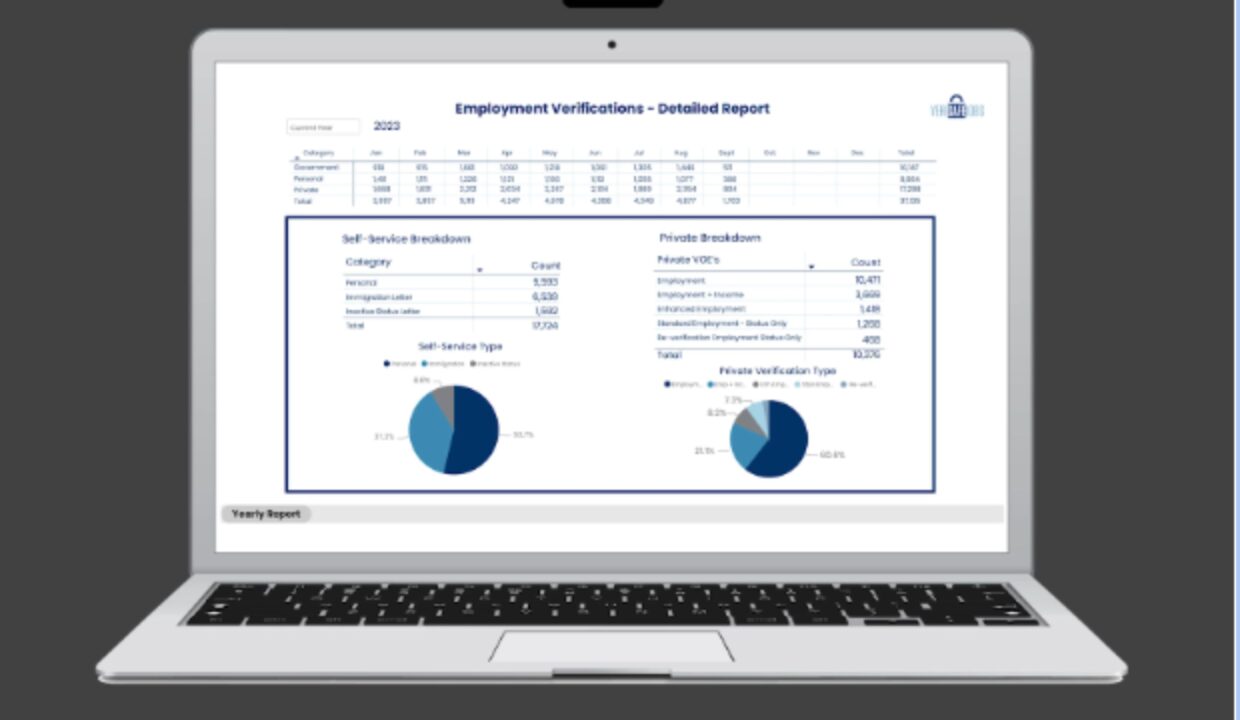
- User-Friendly and Intuitive Interface: Walton’s Verification of Employment (VOE) solution provides a seamless user experience, enabling verifiers to obtain instant verifications while employees retain control of their data through a secure PIN-based system. The intuitive platform simplifies workflows, ensuring a smooth process for all parties involved.
- Dedicated Support for Peace of Mind: Walton’s VOE Solution is built to scale according to your needs. Their exceptional support team is readily available to address any concerns or issues. This proactive assistance alleviates the burden on employers and ensures a hassle-free verification process from start to finish.
Conclusion
Conducting thorough employment background checks is crucial for making informed hiring decisions, ensuring compliance, and maintaining workplace safety. By verifying candidates’ qualifications and past behavior, businesses reduce risks and foster a trustworthy work environment.
Utilizing automated solutions like Walton Management’s Automated Verification of Employment (VOE) Services streamlines this process, improving efficiency and ensuring a user-friendly and intuitive interface. For a faster, more accurate verification of the employment process, schedule an appointment with Walton Management to support your hiring needs and safeguard your organization’s success.

